
So Compact!
A spare Flaparap and pad fit in the palm of your hand.

So Compact!
A spare Flaparap and pad fit in the palm of your hand.

So Pretty!
Brighten up that little bottom.

So Pretty!
Brighten up that little bottom.

So Trim!
Under the belly, Over the thighs. No need for voluminous trousers.

So Many Pads!
Never run out of fresh dry nappies again.

Conventional clothing is the biggest barrier when it comes to offering the pot.
Invest in Flaparaps.
Save your sanity.

Such Useful Pads!
Emergency head wear, bibs, swing wipers, seat covers, doll blankets, face cleaners... and absorbent Flaparap liners.

Hundreds of hours of development.
"; $image_six_years .= "Thousands of hours of testing.
"; $image_six_years .= "Days, Nights, Naps.
"; $image_six_years .= "Newborns, Crawlers, Toddlers.
"; $image_six_years .= "Part-time, Full-time, Anytime.
"; $image_six_years .= "If you practice baby-led potty training...
"; $image_six_years .= "Flaparaps will make your life easier!
"; $image_six_years .= "
From tiddlers to toddlers: One Size Fits All
Thanks to different length elastic belts.

Front, Back or Side?
Flaparaps work lying down.


Production Line
Yes, it is just me.

Look at me go!
I'm like a one woman sweat shop (but I don't work for a dollar a day).
Sleeping on the job
Quick-Dry or 100% wool are good for nights.
(But you still need to change them every time they get wet.)
"; $image_lying_down2 .= "![]()
Totally dotty Born Ready belt.
The silicone dots grip the flap helping to keep it in position.

Silent, stealthy, flat and functional.
"; $image_belt_hook .= "
8 layer small pads, 12 layer large pads.
Accurately cut to shrink and 'full out' in the wash. This increases their absorbency and makes the fabric feel thick and soft.

Flat: Big.
Folded: Slim.
Accurately cut to shrink and 'full out' in the wash. This increases their absorbency and makes the fabric feel thick and soft
"; $image_padsize .= "
High Quality PUL
Waterproof, breathable and won't delaminate in the wash.


Purple outside and in.
Ultra-fast drying Flaparaps.
1. Secure the Belt
2. Insert a Pad3. Tuck in the FlapAnd you're good to go!
"; $image_instructions .= "
Secure the pad all the way to the front of the Flaparap.
"; $image_pad_front .= "
Tuck the flap under the belt...

... and tug to seal the legs.
"; $image_belt_tuck .= "
Shhhhhh. Quietly does it...
Change a pad during a nap
without any drama.

Unflap.
Twist and pull to one side.

Wash before use!
Don't peg by the corners. Instead, fold in half over the line.
I am not a hippy.
I am a Scientist.
"; $image_not_hippy .= "I am not a hippy a heart.
I am a Scientist at heart.
Heart, Soul, Head, Hands. Scientist.
"; $image_heart_soul .= "
Born Ready
in oh so many ways.
(Thanks Evolution!)
Why is this the best kept secret in (Western) baby maintenance?
"; $image_baby_maintenance_secret .= "Will run in November '14.
(I'm revising the format to accommodate folks in different time zones!)
Will run as three sessions in November '14.
"; $image_workshop_dates .= "Sign up below to get details of what's covered and help me choose which age group to focus on.
"; $image_workshop_dates .= "No nappy rash, no barrier cream, no blow outs, no wet wipes, no stinky bins, no vinegar buckets and no need to abandon modern nappies?

Ten days old using a top hat potty (with a bit of help from Dad).
"; $tophat .= "Babies are Born Potty Trained!
Well, not quite.
But the instinct is there if you want to develop it.
Also known as elimination communication (ec), diaper free, nappy free, natural infant hygeine, infant pottying
"; $ec_etc .= "Go Nappy Free!
All of the time.
Or some of the time.
Or hardly at all.
But give it go!
Read about how to start or come for tea in my virtual kitchen and I'll show you.
'All they do is Eat, Sleep and Poo!'
Three things.
Why not help with them all?
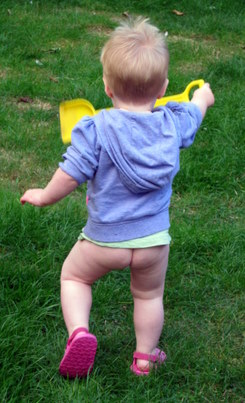
Fifteen months - who wouldn't want a bare bum when it's warm enough?
"; $barebum_outside .= "Bond more closely with your baby.
Understand.
Really understand.
And help out.
Newborns often 'wait' for a nappy change then wee all over the wall.
Can you take a hint?
"; $newborn_wall .= "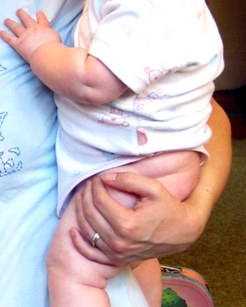
Seven months - just been on the potty so the perfect time for some skin-to-skin contact.
"; $arm_barebum .= "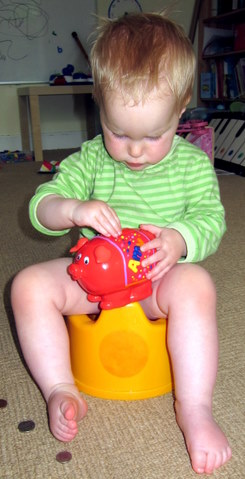
Twelve months and starting to make savings.
"; $piggybank .= "
Twelve months and starting to make savings.
"; $piggybanksq .= "
Three weeks old, 'poo face' (mouth forms the small 'oooh' shape of concentration) - recognise the signals!
"; $pooface .= "When? On Cue!
"; $pooface2 .= " ";
$pooface2 .= "
";
$pooface2 .= "If you recognise the signals and can react quickly, it's the perfect way to get your first catch.
Three weeks old, mouth forms the small 'oooh' shape of concentration just before a bowel movement.
...how you would want your partner to react if you needed help getting to and from the toilet.
"; $little_big_people .= "...how you would react if your two year old clearly needed the toilet.
"; $little_big_people .= "...how you would react if you knew your tiny baby would want to poo after feeding.
"; $little_big_people .= "I like to think of my children as Little Big People (however small they might be).
It helps me to make consistent decisions.
"; $little_big_people .= "What's the best potty sign to use with my baby or toddler?
"; $signing_resources .= "My baby's a toddler! Am I too late to start baby signing?
"; //$signing_resources .= "How clearly will my baby sign to me?
"; //$signing_resources .= "Link to Infographic
"; $signing_resources .= "What's the best potty sign to use with my baby or toddler?
"; $signing_resources_2 .= "My baby's a toddler! Am I too late to start baby signing?
"; //$signing_resources_2 .= "How clearly will my baby sign to me?
"; //$signing_resources .= "Link to Infographic
"; $signing_resources_2 .= "10 Signs of Chronic Constipation Every Parent Should Recognise.
"; $constipation_resources .= "Are There Risks To ec / Baby-led / Early Potty Training?
"; $constipation_resources .= "How To Avoid Chronic Constipation In Poop Trained Toddlers
"; $constipation_resources .= "How to Treat Chronic Constipation (Mechanism and Laxatives Explained).
"; $constipation_resources .= ""; $constipation_resources .= "Create your own, tailor-made, first pottitunity cheat sheet (for free)
"; $starting_resources .= "How do I start baby-led potty training?
"; $starting_resources .= "What are the four phases of potty training? (secret page)
"; $starting_resources .= ""; $starting_resources .= ""; $starting_resources .= "Your state of mind.
"; $flaparap_plug .= "To potty successfully, without sending yourself and your child round the twist, you need to be relaxed.
"; $flaparap_plug .= "But... you also need to offer consistently.
"; $flaparap_plug .= "Flaparaps are the answer. They'll let you stand by your principles without driving your child to rebellion or yourself to insanity.
"; $flaparap_plug .= "In fact, they're prefect for baby-led pottying, even if I do say so myself ;)
"; $flaparap_plug .= "Create your own personal cheat sheet.
"; $image_popup_cheatsheet_quiz .= "I'll guide you through your options as if you were at one of my workshops.
"; $image_popup_cheatsheet_quiz .= "(It's free...)
"; $image_popup_cheatsheet_quiz .= " "; $image_popup_cheatsheet_quiz .= "Easy Peasy Nappy Free Me!
Pick a good time.
Whip off the nappy.
'Assume the position.'
Cue.
Change the way you think.
"; $image_easy_peasy .= "Pregnant? Newborn? Baby-Baby?
Toddler?"; $image_class_list .= "
Potty Training for Toddlers: Understand how your toddler learns.
"; $image_class_toddler .= "Why not try an Online Class!

For babies and toddlers.
A workshop that's local to everyone!
Not keen on reading? Try an Online Class.

Potty Training for Toddlers: Understand how your toddler learns.

Baby-led pottying for newborns and up.
A workshop that's local to everyone!

Potty Training for Toddlers: Understand how your toddler learns.

Baby-led pottying for newborns and up.
A workshop that's local to everyone!
Check Out My Online Classes For babies And Toddlers.
Workshops that are local to everyone!
Show your support and keep up with the latest news: like Born Ready on facebook - Thank you!
"; $fb_like_bornready .= ' '; $fb_like_bornready .= ''; $fb_like_bornready .= 'Keep up with SplitSuit news: like Born Ready on facebook :)
"; $fb_like_bornready_suits .= ' '; $fb_like_bornready_suits .= ''; $fb_like_bornready_suits .= 'For info on ec, baby-led and early potty training: like Born Ready on facebook :)
"; $fb_like_bornready_constipation .= ' '; $fb_like_bornready_constipation .= ''; $fb_like_bornready_constipation .= 'Love Cloth Nappies?
Show your support and like Flaparaps on facebook - thank you!
"; $fb_like_flaparaps .= ' '; $fb_like_flaparaps .= ''; $fb_like_flaparaps .= 'Facebooker?
Show your support and like Flaparaps on facebook - thank you!
"; $fb_like_flaparaps_2 .= ' '; $fb_like_flaparaps_2 .= ''; $fb_like_flaparaps_2 .= 'Facebooker? Give us the thumbs up!
Flaparaps: "; $fb_like_all_3 .= '
'; $fb_like_all_3 .= ''; $fb_like_all_3 .= 'Born Ready: '; $fb_like_all_3 .= '
'; $fb_like_all_3 .= ''; $fb_like_all_3 .= ''; $fb_like_all_3 .= ''; $fb_join_ecuk = "Join my Facebook group to chat to parents who understand!
"; $fb_join_ecuk .= "Real Nappy Week 2015
Save 20% on Instant Access Pottying Classes.
Real Nappy Week 2015
Save 20% on this video class. (20-26th April 2015)
NEW! Top-Up Packs
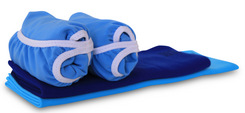
Top-up on Flaparaps, pads and belts in The Born Ready Shop.
"; $image_flaparap_topup .= "
Use your FREE council vouchers in the Born Ready Shop.
If your council isn't part of the RNfL scheme, they might have a real nappy scheme of their own. Some councils will refund your cloth nappy purchase on submission of a receipt.
Investigate! You might end up with free Flaparaps :)
RNfL vouchers range from £40 - £54.15. Well worth googling. Schemes are usually listed as part of waste management / recycling on council websites.
"; $image_rnfl .= "My friend Becky sells hand-made upcycled woollen puddle pads, split pants and other nifty ec gear in the Little Bunny Bear Etsy Shop.
She has a degree in fashion design so everything she makes is beautiful! Pop over and have a look. Find something nice to go with your Flaparaps ;)
"; $bunnybear1 .= "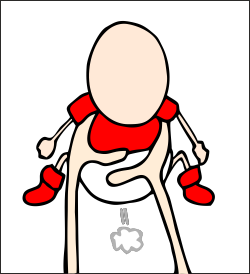
Using a potty is as easy as changing a nappy.
". typeform_popup("Get the Cheat Sheet") . "
"; $image_fart .= "